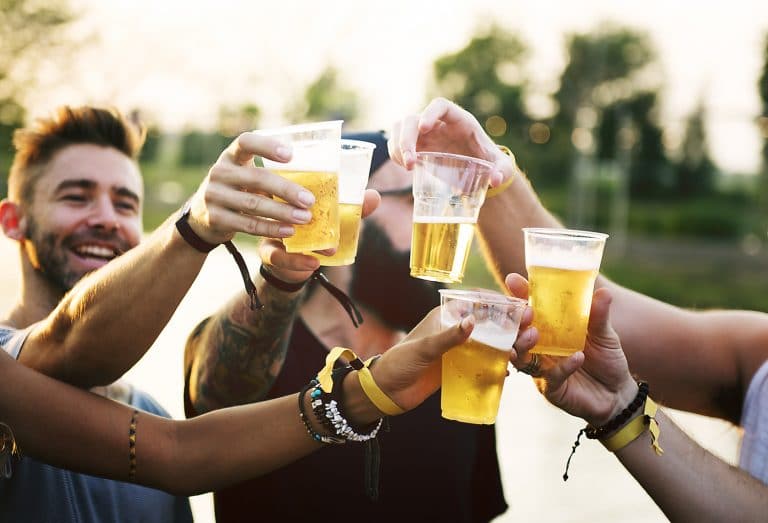5 Signs Your Weekend Drinking Could Be More Of A Problem Than You Realize
By Carol Galbicsek | 5 Sources

Is Your Weekend Drinking Indicative Of A Bigger Problem?
Lush. Boozer. Wino. Drunk. These are some of the stigmas often associated with an individual who struggles with alcohol abuse. People may assume they’re lazy, jobless and drink all from the time they wake up to when they fall asleep. However, this is far from true.
So, what if you only drink on weekends? Weekend drinking can’t possibly mean you have a problem with alcohol, right? False. In fact, binge drinking is defined as men who consume more than four drinks in two to three hours, and women who consume three drinks over the same timeframe.
For example, you may decide to kick off the weekend with a beer, wine or other mixed drink of your choice. What starts off as one drink soon leads to another, and another after that. Before you know it, casual drinking turns sloppy.
Binge drinking on weekends can be harmful to your health. From insomnia to liver problems and trouble breathing, alcohol affects your body in many different ways. Additionally, drinking a large amount of alcohol in a short period of time can trigger symptoms of alcohol poisoning or an alcohol-related coma.
While excessive drinking does not always turn into an addiction, it increases your risk of developing a dependency on alcohol. The line between alcoholism and weekend binge drinking can be blurry, leaving some unsure of when to seek help.
People are drinking at a level that’s putting themselves and others at risk of harm, even if they’re not necessarily meeting criteria for alcohol dependence or for the disease of alcoholism. I think that has some very important implications.
Lead of the alcohol program in the National Center for Chronic Disease Prevention and Health Promotion
Signs Of Drinking Too Much On Weekends
An estimated 10 percent of adults across the nation have an alcohol-use disorder, also known as alcoholism. However, nearly one-third of Americans can be classified as excessive drinkers. Although going out for a few drinks with your friends seems innocent, it can quickly get out of control. Rather than stopping when you should, the weekend warrior in you continues drinking.
Do you know when too much is enough? Here are five key signs of a potential weekend drinking problem.
Finding it difficult to stop drinking after one or two beverages.
You go out on Saturday and tell yourself you’re only going to have one cocktail. After that one drink, you’re unable to stop. Instead, you may find yourself craving a second, third or even more drinks as time goes by. If you’re unable to manage your alcohol consumption on weekends, sometimes the best option is to stop drinking altogether. Taking a break from alcohol — even temporarily — can give you clarity and focus.
Using alcohol as a reward
Alcohol is often used to celebrate an achievement. Sometimes you may try and justify why you deserve a drink, such as finishing an important project at work or making it through a stressful week. Rather than turning to alcohol, come up with a new way to reward yourself. For instance, you can buy a ticket to an event or treat yourself to a nice dinner instead of celebrating with alcoholic beverages.
Feeling guilty after drinking too much.
Some people feel guilty the morning after a long night of drinking. Hangovers aren’t limited to the physical symptoms of overdrinking. In fact, a “moral hangover” is the feeling of embarrassment or disappointment after binge drinking that you can’t seem to shake. Get rid of post-drinking guilt by sticking to alcohol-free drinks. This allows you to enjoy your weekend without feeling remorseful the following day.
Behaving differently from when you’re sober.
Alcohol can bring out a different side of you, causing you to act in ways that can put you, or those around you, in danger. Weekend binge drinking may lead you to doing or saying things that go against your better, sober judgement. For instance, when you’re sober you would probably say no to drinking and driving. However, you may justify getting behind the wheel of a car after heavy drinking.
Becoming aggressive or violent when drinking.
Many studies have shown a link between binge drinking and aggressive, sometimes violent behavior. Alcohol can heighten how you respond to certain situations. For example, if someone makes a rude remark, you may typically blow it off when you’re sober. But when you’re drinking, things can quickly escalate into aggressive behavior. Don’t test your limits – drinking is not worth the risk of lashing out violently or acting aggressively.
Paid Advertising. We receive advertising fees from purchases through the BetterHelp links below.
Online Counseling for Alcohol Addiction
Online therapy can help you with long term addiction support. Start your therapy journey with BetterHelp.
- Personalized Matching Process
- Easy Online Scheduling
- 20,000+ Licensed Therapists
- Personalized Matching Process
- Easy Online Scheduling
- 20,000+ Licensed Therapists
Is It Worth The Risk?
It can be difficult to recognize a drinking problem when it’s not a daily occurrence. However, weekend binge drinking is a major concern when it comes to alcoholism. Consuming excessive amounts of alcohol on weekends not only affects your overall health, it can damage your relationships, career and personal goals.
Drinking can quickly spiral out of control, even if you limit your alcohol intake to weekends. Why take the risk? If you’re someone that’s struggling with excessive alcohol consumption, contact a treatment provider. They can discuss available treatment options with you.
